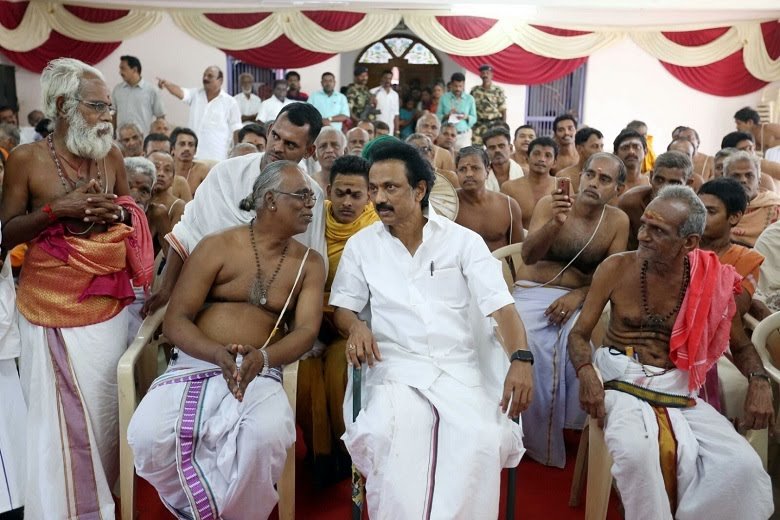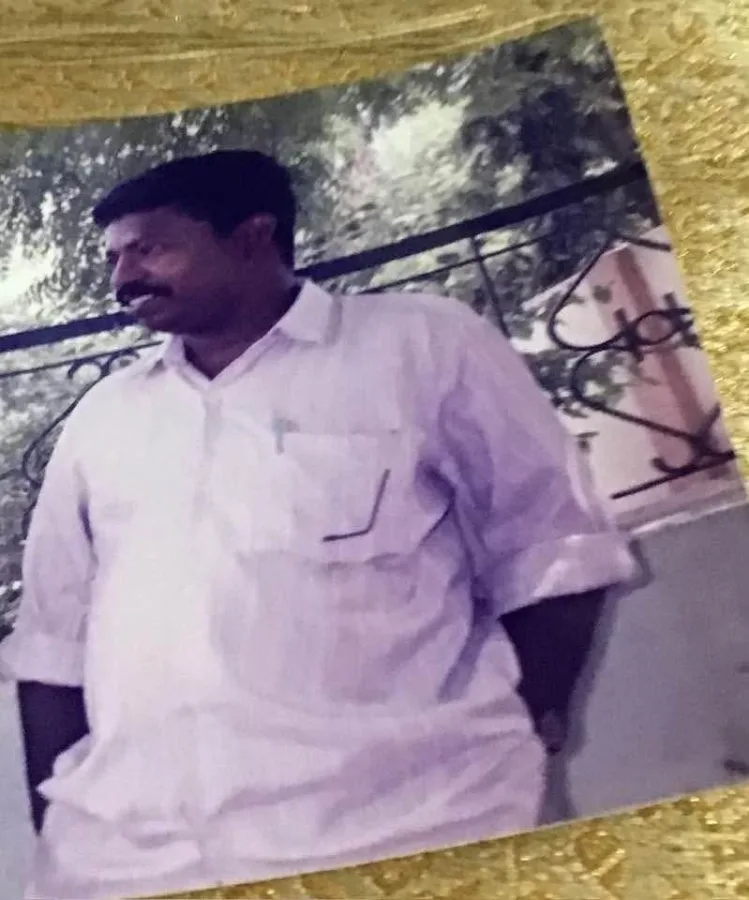Read in : தமிழ்
Is MK Stalin more committed to secularism than his late lamented father? We can begin to believe so, though our own instincts might rebel against such ‘hasty’ judgments. Secularism is under existential threat in the entire country at the moment. Only a few opposition Chief Ministers stand their ground and refuse to be swayed. Easily Nitish Kumar and Stalin remain our best hopes. Pinarayi is always there, but if he wants to compromise, he will have to switch parties!!
Nitish has established his credentials by keeping communal forces under control, even when he was an ally of the BJP. So the award should go to him, no doubt.
But here we are concerned with Stalin, the milieu in which he is operating and his constraints, ideological and otherwise.
When petrol bombs are hurled in a couple of places in the wake of nationwide raids by the National Investigation Agency on the Popular Front of India, it would have been entirely understandable for a Chief Minister to bristle and issue stern warnings to those perceived responsible in an attempt to position himself as a leader intent on upholding lawn and order. But no, Stalin is silent, while the DMK’s mouthpiece ‘Murasoli’ suggests that the police “probe the involvement of BJP functionaries in such incidents”.
Murasoli chose to reproduce as many as 12 news clippings from the past, starting 2017, involving the BJP and RSS members. The common thread was self-inflicted mild damage, the objective having been to instigate communal tension.
In a column the other day, the daily chose to reproduce as many as 12 news clippings from the past, starting 2017, involving the BJP and RSS members. The common thread was self-inflicted mild damage, the objective having been to instigate communal tension.
Whether it is no more than pseudo-secularism we are used to, the type that seeks to gloss over Islamic fundamentalism, remains to be seen. But the fact remains Tamil Nadu has remained largely immune to the communal virus, and it does make eminent sense to be restrained in one’s actions. Looks like Stalin is the man of the hour.
With every passing day, the 69-year-old leader is proving he is a lot more deeply rooted in secular ethos than even his father, and that seems quite surprising, given that he had never been one given to grandstanding or seen as one with any strong ideological moorings.
As a first time MLA, back in the eighties, he would be almost self-effacing, collecting the day’s agenda from the assembly office meant for everyone, amiably nod when anyone greeted him. Unaccompanied by any sidekicks, he would go to his seat, watch the proceedings quietly, seldom interrupting and vanishing equally quietly. This was when he was the son of the Chief Minister and was already seen as a possible successor to his father.
Also Read: Can Annamalai’s BJP fill opposition space in Tamil Nadu
For a long time thereafter he remained in the background, never brash as most CM’s sons are in many states in the country – Stalin’s own elder brother Azhagiri was running his own fiefdom in Madurai down south, thugs at his command, earning a bad name for his party and for his father. And rarely would Stalin be seen in any literary or political gathering, nothing remotely ‘Dravidian’ in his conduct.
But appearances can be deceptive of course. Then firebrand Vaiko, an idol of the cadres, was eased out of the DMK on trumped up charges only because Karunaidhi didn’t like anyone to challenge his own succession plans.
Such was the clout of the ‘low-profile’ Stalin that Karunanidhi’s nephew and conscience-keeper Murasoli Maran himself publicly protested distribution of tickets and alliance with caste outfits in 2001 assembly polls, attributing it all to Stalin. He was sulking for a while and even threatened to quit politics.
In the event Maran’s perceptions proved right, and the DMK-led alliance was humbled. But it did not seem to dent Stalin’s fortunes, which were steadily rising.
It was in 2007-08, the father started dropping not-so-subtle hints that his second son would be anointed sooner than later. Every time he threw a hint, Azhagiri would throw a fit and a hapless MK would walk back, sort of. But there was no stopping Stalin. Eventually he was made Deputy Chief Minister and he also went on to assume the party mantle when the father became disabled, unable to even speak.
Also Read: BJP woos DMK, puts off decision on alliance till polls
There was little Azhagiri could do. And much less Kanimozhi though she is a lot more accomplished. She did not join hands with the disgruntled Azhagiri but seems happy to be allowed a niche somewhere.
There was this passionately pro-DMK journo who would make no secret of his contempt for Stalin and would dismiss him as a dud, who would indeed prove a disaster. He should be busy eating crows these days.
Barring his detention under MISA during the Emergency, there was little to suggest Stalin was the son of his father, politically or ideologically. But if secularism is a sacred creed of the DMK, Stalin has fared much better than Karunanidhi himself.
It was during the latter’s reign Coimbatore was rocked by a series of blasts in 1998 – in a span of six hours, the city witnessed 12 explosions that killed 58 people and injured more than 200 people.
The state government seemed strangely indifferent when fundamentalist grouping Al Umma was spreading its tentacles and there were communal clashes too in the city, but later there was a draconian crackdown, innocents were jailed and families ruined. Seventeen of the convicts are indeed behind bars still.
Still later Karunanidhi joined hands with the BJP itself, becoming a partner of the NDA in 1999, dodging questions on the Godhra riots. He discovered the dangers of communalism only when the 2004 elections were nearing.
Hunting with the hounds and running with the hares was almost part of his personality, and thus when the BJP was not much of a force in the state, and even at the national level, Modi was yet to arrive. Thus with much less compulsions, he chose to hum and haw, making a mockery of his secular credentials.
It is now very different but. Modi has become an icon of sorts. The BJP is everywhere. The Congress is almost obliterated. Even in Tamil Nadu, with the AIADMK a ghost of its former self and the Congress much weaker than the national unit, it leaves the space wide open for the BJP.
Barring his detention under MISA during the Emergency, there was little to suggest Stalin was the son of his father, politically or ideologically. But if secularism is a sacred creed of the DMK, Stalin has fared much better than Karunanidhi himself.
MK Stalin’s advantage of course is there is no opposition worth speaking of. He has no Jayalalithaa or MGR to be afraid of. How much inroad Hindu communal tendencies are making is anybody’s guess.
Besides there are always corruption charges haunting his clan, and Modi has never been loath to unleash the central agencies.
All that Stalin would allow but by way of safeguarding his position is some leeway for his Hindu Religious and Charitable Endowments minister, more than what would be the case under DMK rule in the past. He is not very strident in his criticism of Modi on any front.
But he doesn’t leave room for speculations, firmly positions himself with the secular parties at the national level, greets Rahul Gandhi as he launches his Jodo Yatra, keeps naming him as the Prime Ministerial candidate, rubs shoulders with the Marxist Pinarayi and declares time and again there would be no alliance with the BJP. This is not to mention his government’s efforts to rein in communal elements, without being seen as vindictive.
Why would MK Stalin prove more administratively competent or demonstrably secular than his father who came through fire, as it were? It is difficult to say. May be he learnt the right lessons, and we are better off for that.
Read in : தமிழ்











